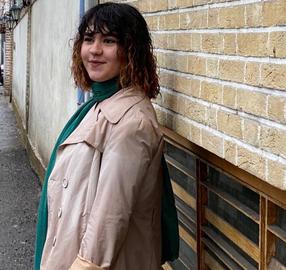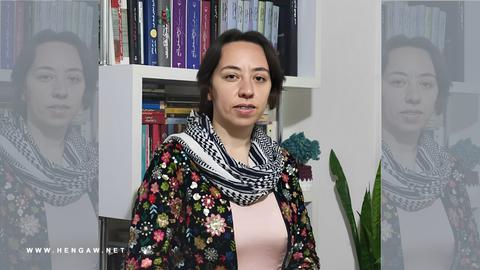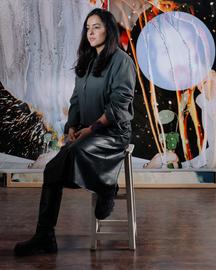Shahla Sherkat was the first Iranian woman to be awarded the International Women’s Media Foundation’s Courage in Journalism Award In 2005. The magazine published by Sherkat “consistently covers women’s issues in a way that Iranian society considers taboo, including articles on divorce laws, prostitution, HIV/AIDS, domestic abuse and maternal custody issues,” the foundation said in its press release. The foundation highlighted a 1998 investigative report that criticized the government’s failure to take action to combat HIV. It also celebrated articles that covered the “controversial topic of prostitution in Iran” and gender discrimination in Iranian universities, published in 2003 and 2004, respectively.
In the same year, Sherkat also received the Louis Lyons Award from the Nieman Foundation for Journalism at Harvard University, a prize that “recognizes displays of conscience and integrity by individuals, groups or institutions in communications.”
Shahla Sherkat was born in 1956 in Isfahan and was 11 when her family moved to Tehran. She received a bachelor’s degree in clinical psychology from Tehran University and a master’s degree in women’s studies from Allameh Tabatabaei University.
She began her career in journalism as a reporter and assistant editor for Pooyandegan-e Rah-e Zeynab (Followers of Zeinab’s Path), a weekly government-owned women’s magazine edited by Zahra Rahnavard, who is married to Green Movement leader Mir Hossein Mousavi. She was appointed editor-in-chief of Zan-e Emrooz (Today’s Woman) when she was 25. Before the 1979 Islamic Revolution, Zan-e Emrooz was the most popular women’s magazine, but the government took full control of it once the Islamic Republic was established. The magazine became more feminist in its content during Sherkat’s 10-year editorship, and eventually the government shut it down.
In 1992, Sherkat launched the monthly publication Zanan (Women), which ran for 16 years.
Non-Stop Harassment
Extremist gangs routinely attacked Zanan’s offices throughout the early and mid-1990s, breaking windows, desks and furniture. On one occasion, Sherkat confronted the gangs in the office after they had ransacked it, arguing with them for six hours before they left the premises. She tried to bring charges against the attackers, but the police refused to intervene.
Sherkat was frequently summoned by the Press Court to answer for articles she published, including one written by the 2003 Nobel Peace Prize Laureate Shirin Ebadi and a series of articles by human rights lawyer Mehrangiz Kar about Islamic laws relating to women.
In January 2001, Tehran’s Revolutionary Court fined and sentenced Sherkat to four months in prison on charges of anti-Islamic activities after she attended a conference held at the Heinrich Boll Institute in Berlin entitled “The Future of Reform in Iran.” Members of the Iranian judiciary considered the conference “harmful to national security” because they viewed it as a plot to overthrow the Islamic Republic. Speaking at the conference, Sherkat had said that the Islamic dress code should be encouraged instead of being mandatory. She appealed the verdict against her and was not required to serve the prison sentence, but she was forced to pay a fine. At least 10 other participants in the conference were arrested and sentenced to various prison terms.
Sherkat had to cope with the authorities’ constant threats to shut down Zanan. “Many times my writers or readers asked me to put something in the magazine and I sat down and measured the costs and the benefits of printing something,” she said in an interview after receiving the Courage in Journalism Award. “Sometimes you print something that is of extreme value, meaning that it has a very positive impact on the reader and that one piece does great work in society. I may decide to do that even if it leads to the closure of the magazine. But many times one weighs the costs and benefits and sees it may not be worth causing problems for a 10-year-old publication that may live for another 10 years.”
Sherkat was relatively cautious, but eventually she was unable to save the magazine. In 2008, during the presidency of Mahmoud Ahmadinejad, the Press Supervisory Board shut down Zanan after 16 years, accusing it of “presenting a pessimistic picture of the situation for Iranian women.” After the closure, Sherkat said that the board had pointed to reports about crimes against or by women that relied on statistics published by the government.
Dashed Hopes
When Hassan Rouhani was elected president in 2013, human and women’s rights activists and journalists felt a new wave of optimism. Rouhani had called for gender equality and promised more freedom for Iranians. Sherkat applied for a permit to publish a new monthly called Zanan-e Emrooz (Women of Today). The permit was granted and the first issue was published in May 2014.
It did not take long for Farhang News, a website affiliated with the hardliners, to warn against the "return of the feminists," saying Zanan-e Emrooz carried on the mission set out by Zanan, only under a different name. And the Paydari website said the magazine's release was "another failure by the Ministry of Culture of [Rouhani's] government.”
According to women’s rights activist Susan Tahmasebi, the Guardian newspaper reported, Sherkat has always been very aware, and wary of, the red lines imposed by the Islamic Republic, especially with regard to women’s issues. But this did not protect her from attacks and criticism. The hardline daily Kayhan, which is run under the supervision of the office of the supreme leader, claimed that Sherkat “works on feminist issues with groups opposed to the Islamic establishment.” The Mashregh News website wrote that objections to Zanan-e Emrooz could be attributed to Sherkat’s background and past work. “Because of the influence from feminist movements in the West, religion is being cited as one of the obstacles to the achievement of women’s rights,” the site reported.
Sherkat’s new venture came to an end after only 11 issues and without prior notice. On April 27, 2015, Iran’s Ministry of Islamic Culture and Guidance ordered the closure of Zanan-e Emrooz. The order followed publication of a series on “white” or common-law marriage, a taboo subject among hardliners in Iran.
“The Supervisory [Press] Board did not give any notice,” Sherkat told IranWire at the time. In fact, she said, the magazine’s staff had not been informed at all. Sherkat herself read the news on Tasnim News Agency’s website just as Zanan-e Emrooz was going to press.
Tasnim and Mehr news agencies reported that, at its last meeting, the press board had discussed the “promotion of white marriage, which is contrary to religious and national values.” After reviewing Zanan-e Emrooz’s reports on the subject, the board decided that the magazine was guilty of promoting the “phenomenon” in a number of articles. “Based on Paragraph 2, Article 6 of the Islamic Republic’s Press Law, the articles were deemed to be contrary to public morality, and the publication was shut down.” The case was referred to the court, Tasnim reported.
“We did not promote it, nor did we justify it,” the magazine’s Facebook page said. “We just explained it. As it happens, we also reported on the experiences of women who believe that such a relationship sacrifices women’s rights. Two sociology experts gave their opinion about the imprudent nature of it and the legal section of the magazine warned women against it. This was the whole story. Before the magazine was shut down, nobody asked us about what we had written and why. We were not given a chance to be heard and defend ourselves. Nobody told us that everybody else can talk about this issue except this magazine, which is dedicated to women. Nobody knows where to bring up issues that women face in this society.”
visit the accountability section
In this section of Iran Wire, you can contact the officials and launch your campaign for various problems
























comments